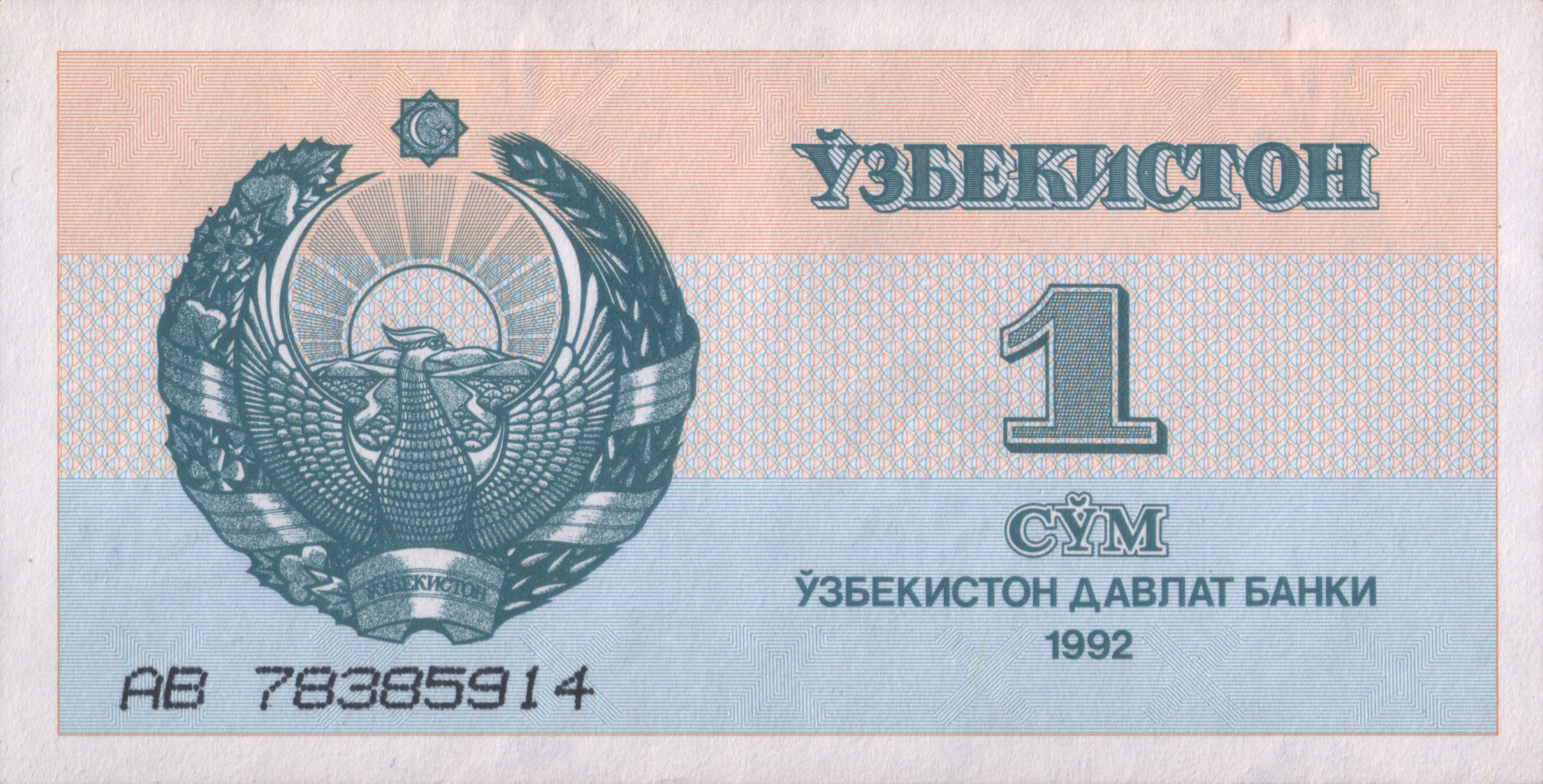|
Tiyin
Tiyin (Cyrillic "тийин") is a unit of currency of Uzbekistan, equal to of a soum. The tiyin was also the name of a subunit of the Kazakhstani tenge The tenge ( or ; kk, теңге, teñge, ; sign: ₸ ; code: KZT) is the currency of Kazakhstan. It is divided into 100 tiyn ( kk, тиын, tıyın also transliterated as ''tiyin''). History After the breakup of the Soviet Union in December ... until 1995. The Uzbek tiyin is the world's lowest value coin that was still legal tender until March 1st 2020, although in practice it was rarely found in circulation. - BBC News, 26 February 2013 References [...More Info...] [...Related Items...] OR: [Wikipedia] [Google] [Baidu] |
Uzbekistani Soum
The sum (; uz, soʻm in Latin script, сўм in Cyrillic script, سوم in Arabic script; ISO code: UZS) is the official currency of Uzbekistan. Etymology The official name of the Soviet currency in Kazakh, Kyrgyz, Tajik, and Uzbek was ''som'', and this name appeared written on the back of banknotes, among the texts for the value of the note in all 15 official languages of the USSR. The word ''sum'' (alternatively transliterated "som" or "soum") means "pure" in Kazakh, Kyrgyz, Uyghur and Uzbek, as well as in many other Turkic languages. The word implies "pure" silver or gold. First sum History Like other republics of the former Soviet Union, Uzbekistan continued using the Soviet/Russian ruble after independence. On 26 July 1993, a new series of Russian ruble was issued and the old Soviet/Russian ruble ceased to be legal tender in Russia. Some successor states had their national currencies before the change, some chose to continue using the pre-1993 Soviet/Russian ru ... [...More Info...] [...Related Items...] OR: [Wikipedia] [Google] [Baidu] |
Kazakhstani Tenge
The tenge ( or ; kk, теңге, teñge, ; sign: ₸ ; code: KZT) is the currency of Kazakhstan. It is divided into 100 tiyn ( kk, тиын, tıyın also transliterated as ''tiyin''). History After the breakup of the Soviet Union in December 1991, most of the formerly Soviet republics attempted to maintain a common currency. Some politicians hoped to at least maintain "special relations" among former Soviet republics (the "near abroad"). Other reasons were the economic considerations for maintaining the rouble zone. The wish to preserve strong trade relations between former Soviet republics was considered the most important goal. The break-up of the Soviet Union was not accompanied by any formal changes in monetary arrangements. The Central Bank of Russia was authorized to take over the State Bank of the USSR (Gosbank) on 1 January 1992. It continued to ship Soviet notes and coins to the central banks of the eleven newly independent countries, which had formerly been the main ... [...More Info...] [...Related Items...] OR: [Wikipedia] [Google] [Baidu] |
Uzbekistan
Uzbekistan (, ; uz, Ozbekiston, italic=yes / , ; russian: Узбекистан), officially the Republic of Uzbekistan ( uz, Ozbekiston Respublikasi, italic=yes / ; russian: Республика Узбекистан), is a doubly landlocked country located in Central Asia. It is surrounded by five landlocked countries: Kazakhstan to the north; Kyrgyzstan to the northeast; Tajikistan to the southeast; Afghanistan to the south; and Turkmenistan to the southwest. Its capital and largest city is Tashkent. Uzbekistan is part of the Turkic world, as well as a member of the Organization of Turkic States. The Uzbek language is the majority-spoken language in Uzbekistan, while Russian is widely spoken and understood throughout the country. Tajik is also spoken as a minority language, predominantly in Samarkand and Bukhara. Islam is the predominant religion in Uzbekistan, most Uzbeks being Sunni Muslims. The first recorded settlers in what is now Uzbekistan were Eastern Iranian no ... [...More Info...] [...Related Items...] OR: [Wikipedia] [Google] [Baidu] |
Currency
A currency, "in circulation", from la, currens, -entis, literally meaning "running" or "traversing" is a standardization of money in any form, in use or circulation as a medium of exchange, for example banknotes and coins. A more general definition is that a currency is a ''system of money'' in common use within a specific environment over time, especially for people in a nation state. Under this definition, the British Pound Sterling (£), euros (€), Japanese yen (¥), and U.S. dollars (US$)) are examples of (government-issued) fiat currencies. Currencies may act as stores of value and be traded between nations in foreign exchange markets, which determine the relative values of the different currencies. Currencies in this sense are either chosen by users or decreed by governments, and each type has limited boundaries of acceptance - i.e. legal tender laws may require a particular unit of account for payments to government agencies. Other definitions of the term "curren ... [...More Info...] [...Related Items...] OR: [Wikipedia] [Google] [Baidu] |
Economy Of Uzbekistan
The economy of Uzbekistan was formerly associated with a Soviet-style command economy, with a slow transformation to a market economy. However, in recent years and since the election of President Shavkat Mirziyoyev the country has seen rapid economic and social reform, aimed at boosting growth and transforming Uzbekistan into a true, modern market economy. International Financial Institutions, including EBRD, Asian Development Bank and the World Bank are actively engaging in supporting Uzbekistan's successful reform process and have rapidly increased their presence in the country. To this point, governmental economic policy reforms had been cautious. Under the administration of Islam Karimov currency conversion capacity was restricted and many other government measures to control economic activity, including the implementation of severe import restrictions and sporadic closures of Uzbekistan's borders with neighboring Kazakhstan, Kyrgyzstan, and Tajikistan led international lend ... [...More Info...] [...Related Items...] OR: [Wikipedia] [Google] [Baidu] |


